Encrypted DNS
(September 2020 Update)
Carsten Strotmann
Created: 2020-09-23 Wed 13:41
All content © 2020 Internet Systems Consortium, Inc.

Agenda
- DNS-Privacy
- DoH/DoT/DoQ
- The current status
- Oblivious DoH and Adaptive DNS resolver discovery
All content © 2020 Internet Systems Consortium, Inc.

About me?
Carsten Strotmann
DNS(SEC)/DANE/DHCP/IPv6 trainer and supporter
RIPE/IETF
All content © 2020 Internet Systems Consortium, Inc.

Privacy in DNS?
- in recent years, the IETF has expanded the DNS protocol with privacy features
- DNS-over-TLS (Transport-Encryption between DNS client and DNS resolver)
- DNS-over-HTTPS (Transport-Encryption between DNS client and DNS resolver)
- QNAME Minimization (less metadata in DNS)
- EDNS-Padding (hiding of DNS data in encrypted connections)
All content © 2020 Internet Systems Consortium, Inc.

The need for more DNS privacy
- a study presented at IETF 105 during the Applied Networking Research Workshop in July 2019 found that
- 8.5 % of networks (AS) intercept DNS queries (27.9% in China)
- (today) most queries are answered un-altered
- but the situation might change, intercept server might change DNS answers
All content © 2020 Internet Systems Consortium, Inc.

encrypted transport for DNS
All content © 2020 Internet Systems Consortium, Inc.

encrypted DNS terminology
- Terminology
Do53= DNS-over-Port53 - classic DNS (UDP/TCP port 53)DoT= DNS-over-TLS - TLS as the transport for DNSDoH= DNS-over-HTTPS - HTTPS as the transport for DNSDoQ= DNS-over-QUIC - QUIC as the transport for DNSDoC= DNS-over-Cloud - DNS resolution via cloud services (Google, Q9, Cloudflare …)
All content © 2020 Internet Systems Consortium, Inc.

DoT - DNS-over-TLS
- RFC 7858 "Specification for DNS over Transport Layer Security (TLS)"
- DNS wireformat over TLS over TCP
- Port 853 (TCP)
- Encryption and Authentication (Internet PKI or via DANE)
All content © 2020 Internet Systems Consortium, Inc.

DoH - DNS over HTTP(S)
- RFC 8484 DNS Queries over HTTPS (DoH) (P. Hoffman, ICANN and P. McManus, Mozilla)
- DNS HTTP-Format over HTTPS over TCP, Port 443 (HTTP/2)
- URL:
https://server/dns-query{?dns} - Encryption, Authentication and Cloaking
All content © 2020 Internet Systems Consortium, Inc.

DoT vs DoH
- differences between DoT and DoH
- DoT can be easily blocked, because it is running on an dedicated port (853)
- DoH is made to look like normal HTTPS traffic, selective blocking of DoH is difficult
- DoH seems to be easier to implement, because of existing HTTPS library functions in programming languages
- DoH enables developers to do DNS name resolution on an application level, which some people think is bad
All content © 2020 Internet Systems Consortium, Inc.

Controlling DoH - the Canary Domain
All content © 2020 Internet Systems Consortium, Inc.

Controlling DoH - the Canary Domain
- Mozilla has implemented a check for a Canary Domain in Firefox
- Domain Name
use-application-dns.net.- if the domain-name can be resolved via DNS53 -> unmanaged DNS, DoH can be auto-enabled
- if the domain-name cannot be resolved (= is blocked) -> managed DNS, DoH will not be auto-enabled (but users can manually enable DoH)
- the IETF is discussing similar signalling functions: "Signaling resolver's filtering policies" (draft-mglt-add-signaling-filtering-policies)
All content © 2020 Internet Systems Consortium, Inc.

other checks done by Firefox before enabling DoH
- Resolve canary domains of certain known DNS providers to detect content filtering
- Resolve the safe-search variants of
google.comandyoutube.comto determine if the network redirects to them - On Windows and macOS, detect parental controls enabled in the operating system
- additional checks performed for private enterprise networks are:
- Is the Firefox
security.enterprise_roots.enabledpreference set to true? - Is any enterprise policy configured?
- Is the Firefox
All content © 2020 Internet Systems Consortium, Inc.

Current DoT/DoH client status
All content © 2020 Internet Systems Consortium, Inc.

Firefox Browser
- Firefox Trusted Recursive/Remote Resolver (TRR) Program
- Cloudflare (default) or NextDNS
- Comcast XFinity (coming)
- automatic rollout started in February 2020
All content © 2020 Internet Systems Consortium, Inc.

Chrome(ium) Browser
- DoH is implemented and can be enabled by the user
- Google Chrome
- Opera
- Vivaldi
- Brave
- Microsoft Edge
- Bromite
- DoH "auto upgrade" for the configured DNS resolvers (manual configured or DHCP/RA supplied)
- Google is experimenting with adaptive DoH-Resolver-Discovery via DNS
All content © 2020 Internet Systems Consortium, Inc.

Microsoft Windows 10 (1/2)
- support in latest "Insider" builds of Windows 10
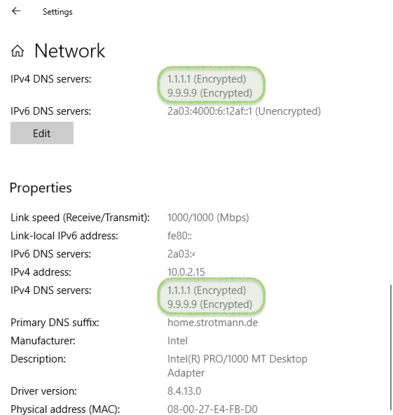
All content © 2020 Internet Systems Consortium, Inc.

Microsoft Windows 10 (2/2)
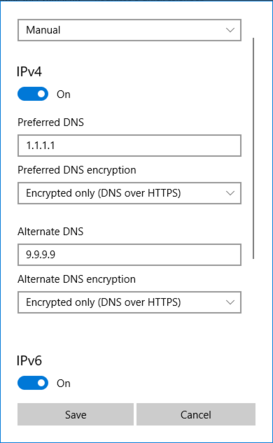
All content © 2020 Internet Systems Consortium, Inc.

Linux
- DoT support in
systemd-resolvedfor some time - opportunistic mode only (automatic fallback to DNS53)
- no server authentication (MITM possible)
- global or "per interface" setting
- not enabled by default
All content © 2020 Internet Systems Consortium, Inc.

OpenBSD
- DoT support in
unwind - not enabled by default
- opportunistic "auto update" mode or manual configured "strict" mode
- server authentication via TLS certificate
All content © 2020 Internet Systems Consortium, Inc.

Android
- DoT available from Andoid 9 "Pie"
- manual setting
- "auto upgrade" from the configured DNS resolver, or Google DNS as fallback
- auto upgrade to DoH in Chrome for Android Version 85+ (September 2020)
All content © 2020 Internet Systems Consortium, Inc.

Apple MacOS 11 and iOS/iPadOS 14
- support for DoT and DoH
- global and per App/Application resolver selection possible
- "encrypted DNS" configuration Apps possible, user can choose provider by installing App
- OS can learn "per Domain" DoH/DoT setting via DNS or HTTP (Adaptive DNS-over-HTTPS)
- OS can discover DoH/DoT Server via DHCP/PvD (Provisioning Domains)
or queries to
resolver.arpavia classic DNS53 - Discovery methods in active discussion in the IETF ADD working group
All content © 2020 Internet Systems Consortium, Inc.

Current DoT/DoH server status
All content © 2020 Internet Systems Consortium, Inc.

BIND 9
- DoH/DoT support is currently in the BIND 9.17 development branch (not for production use)
- BIND 9.18 will contain DoH and DoT support
- scheduled for early in 2021, will be the ‘2021 stable release’
- ISC has also committed to backporting DoH and DoT to BIND 9.16 (Extended Support Version)

All content © 2020 Internet Systems Consortium, Inc.

Unbound
- the Unbound DNS resolver does support DoT since 2017 (and had support for DNS-over-SSL via Port 443 before that)
- support for DNS-over-HTTPS (DoH) has been merged into the Unbound source code and is scheduled for Unbound 1.11.1 in October 2020
All content © 2020 Internet Systems Consortium, Inc.

other DNS Resolver
- dnsdist is an open source DNS load-balancer that supports DoT and DoH
- some commercial TLS loadbalancer (e.g. A10) support DoH and/or DoT
- NGINX, the popular open source webserver and protocol proxy, does support DoT and DoH
- more DoT/DoH implementations can be found on the presenters encrypted DNS implementations page
All content © 2020 Internet Systems Consortium, Inc.

Adaptive DNS-over-HTTPS
All content © 2020 Internet Systems Consortium, Inc.

Adaptive DNS-over-HTTPS
- Goals (directly taken from the Internet Draft):
- No party other than the client and server can learn or control the names being queried by the client or the answers being returned by the server.
- Only a designated DNS resolver associated with the deployment that is also hosting content will be able to read both the client IP address and queried names for Privacy-Sensitive Connections.
- Clients will be able to comply with policies required by VPNs and local networks that are authoritative for private domains
All content © 2020 Internet Systems Consortium, Inc.

Designated DoH server for domains
- DoH Servers for a domain can be learned
- from DNSSEC secured HTTPS/SVCB records
- HTTP(S)
ALT-SVCheader - DoH-Server "well-known" URL
- local provisioning domain (PvD)
All content © 2020 Internet Systems Consortium, Inc.

HTTPS Record
- eliminates additional roundtrip (DNS or HTTP)
- the HTTPS DNS record provides
- address information (
ipv4hint,ipv6hint) - protocol information (protocol upgrade request -> HTTP/3[QUIC])
- public keys (encrypted client hello)
- other data, such as encrypted DNS resolver hint (
dohuri)
- address information (
All content © 2020 Internet Systems Consortium, Inc.

HTTPS Record Example
example.com. IN HTTPS 0 svc.example.net. svc.example.net. IN HTTPS 2 svc1.example.net. ( dohuri=https://doh.example.net/dns-query odohkey="..." )
https://www.ietf.org/id/draft-ietf-dnsop-svcb-https-01.txt
All content © 2020 Internet Systems Consortium, Inc.

Oblivious DoH (oDoH)
- oDoH is an extension to DoH that allows client IP addresses to be disassociated from queries via proxying (pauly-dprive-oblivious-doh)
All content © 2020 Internet Systems Consortium, Inc.

Adaptive DNS Discovery and oDoH
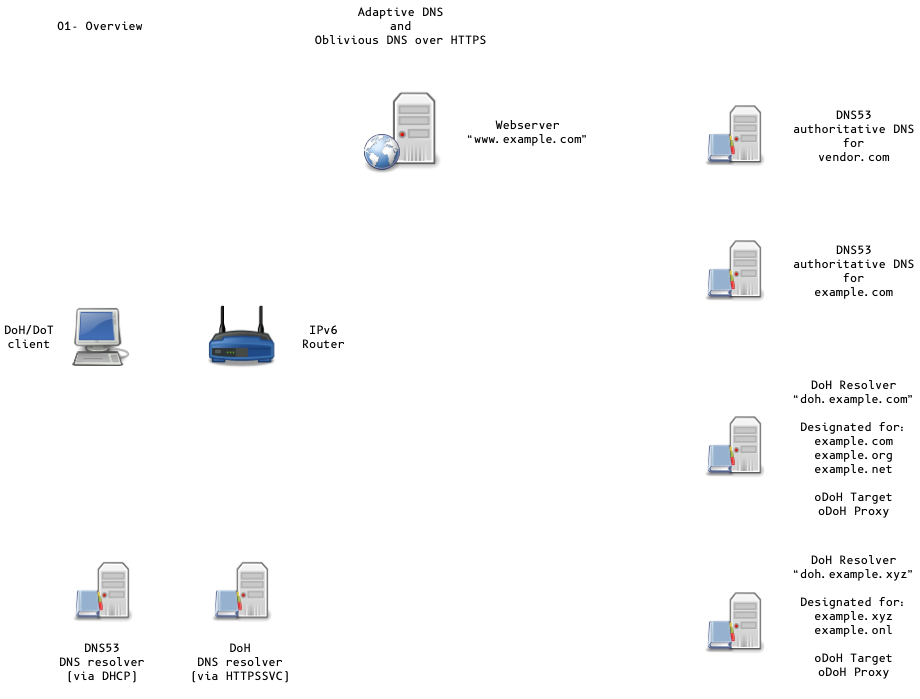
All content © 2020 Internet Systems Consortium, Inc.

Adaptive DNS Discovery and oDoH
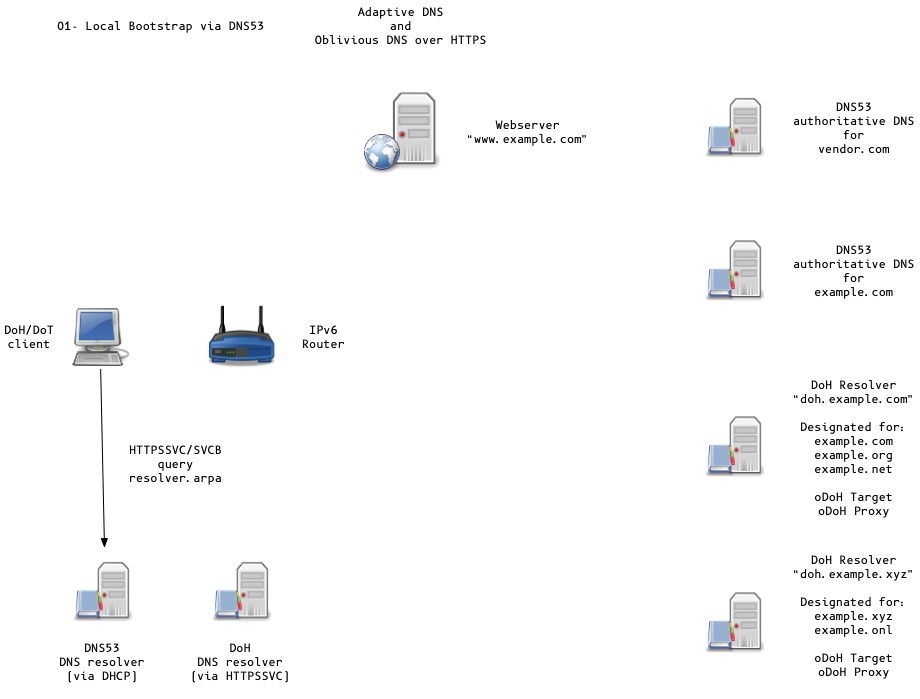
All content © 2020 Internet Systems Consortium, Inc.

Adaptive DNS Discovery and oDoH
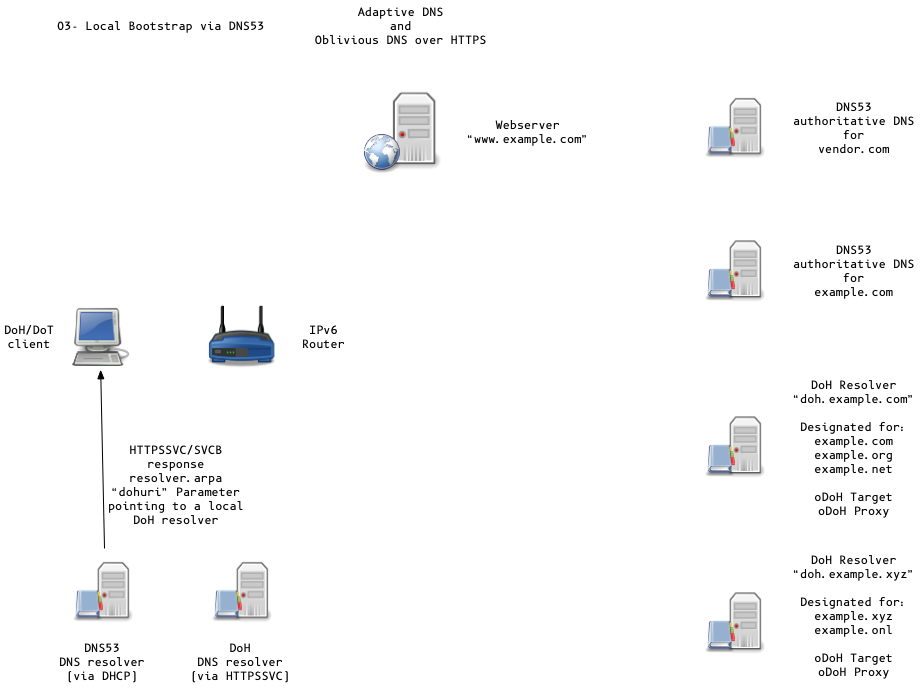
All content © 2020 Internet Systems Consortium, Inc.

Adaptive DNS Discovery and oDoH
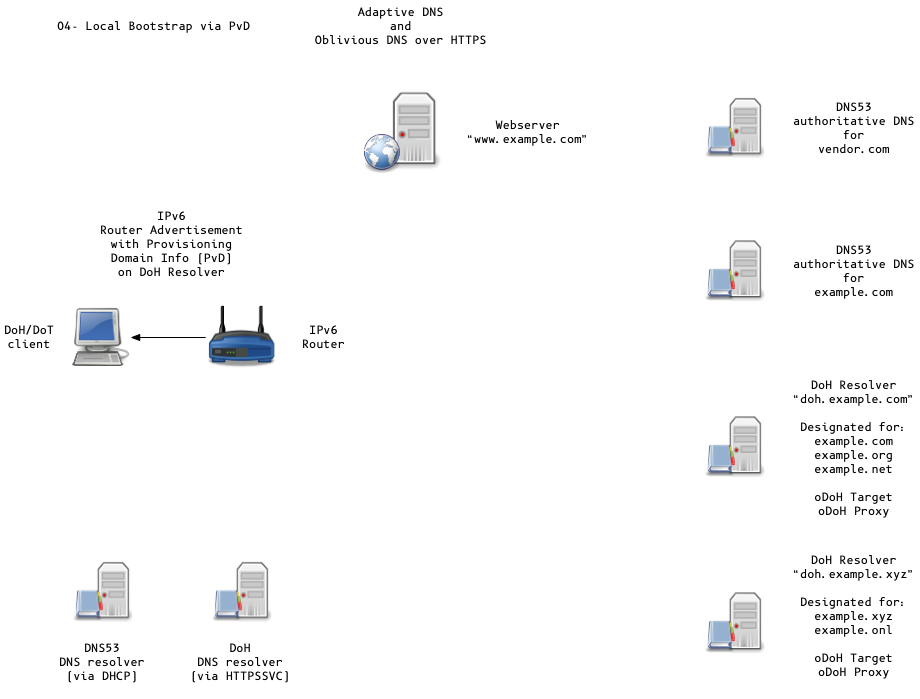
All content © 2020 Internet Systems Consortium, Inc.

Adaptive DNS Discovery and oDoH
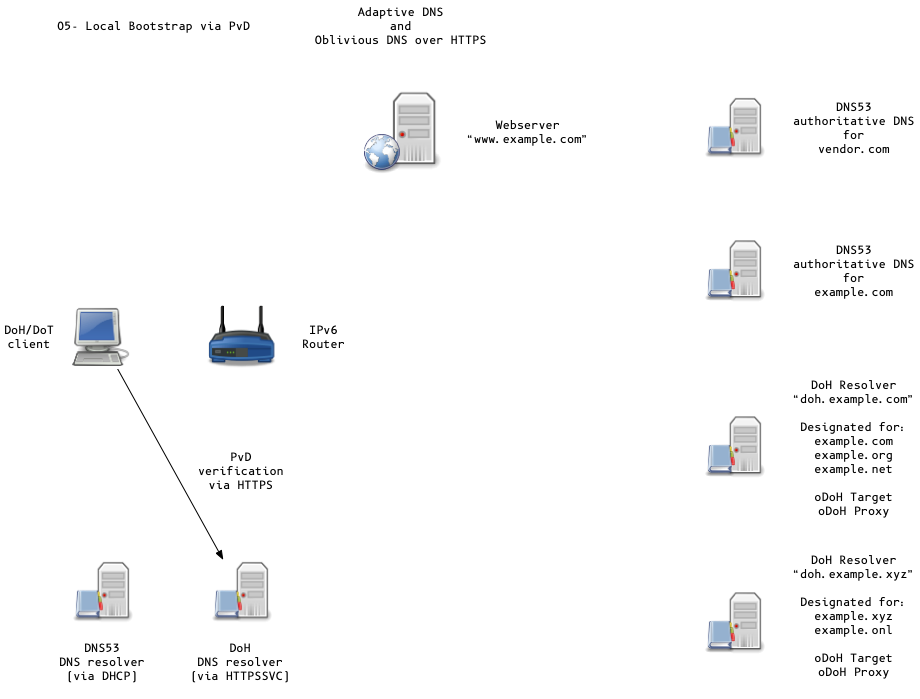
All content © 2020 Internet Systems Consortium, Inc.

Adaptive DNS Discovery and oDoH
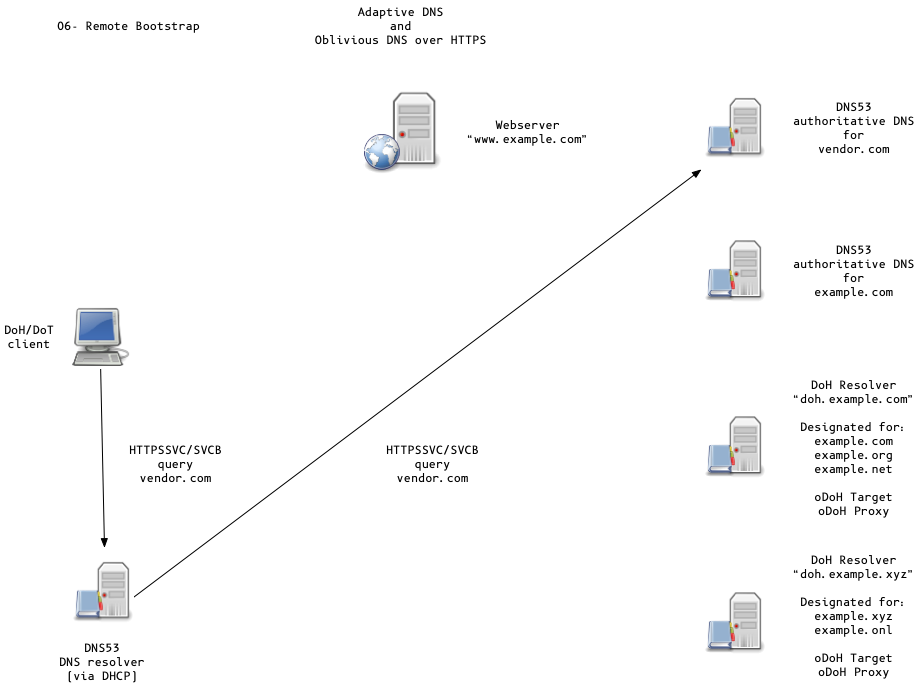
All content © 2020 Internet Systems Consortium, Inc.

Adaptive DNS Discovery and oDoH
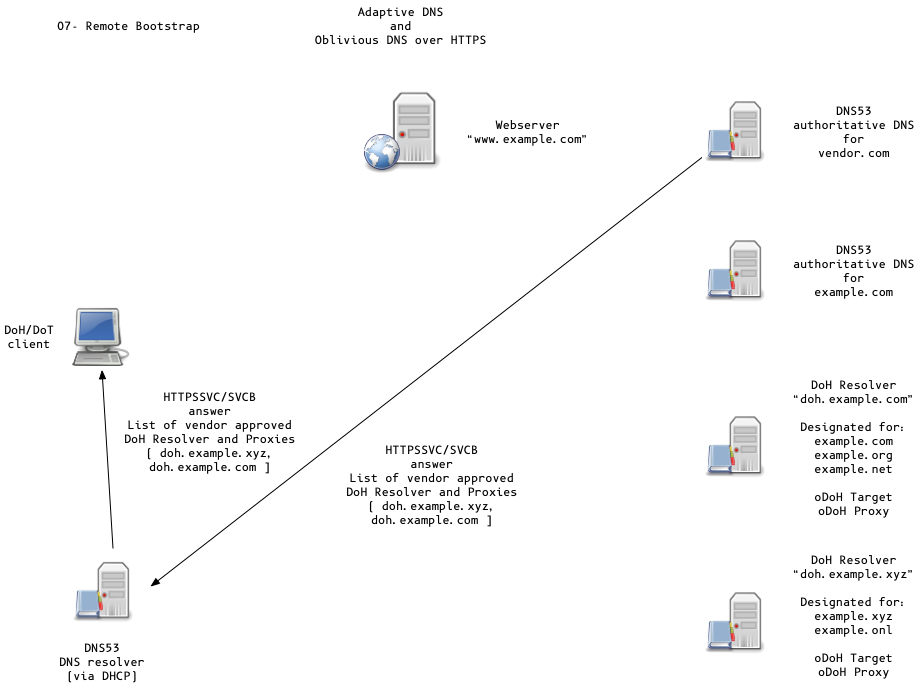
All content © 2020 Internet Systems Consortium, Inc.

Adaptive DNS Discovery and oDoH
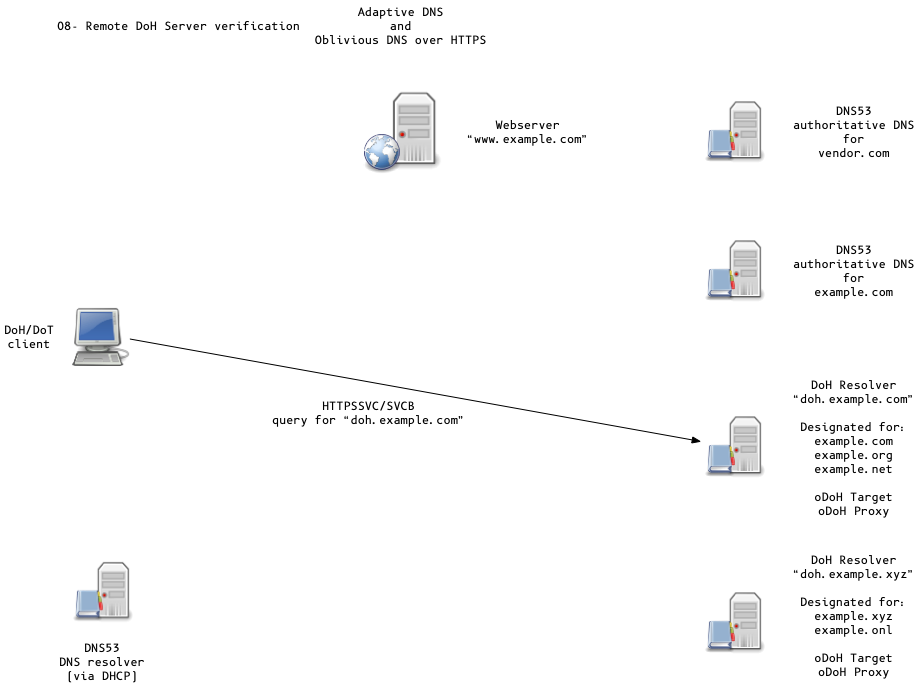
All content © 2020 Internet Systems Consortium, Inc.

Adaptive DNS Discovery and oDoH
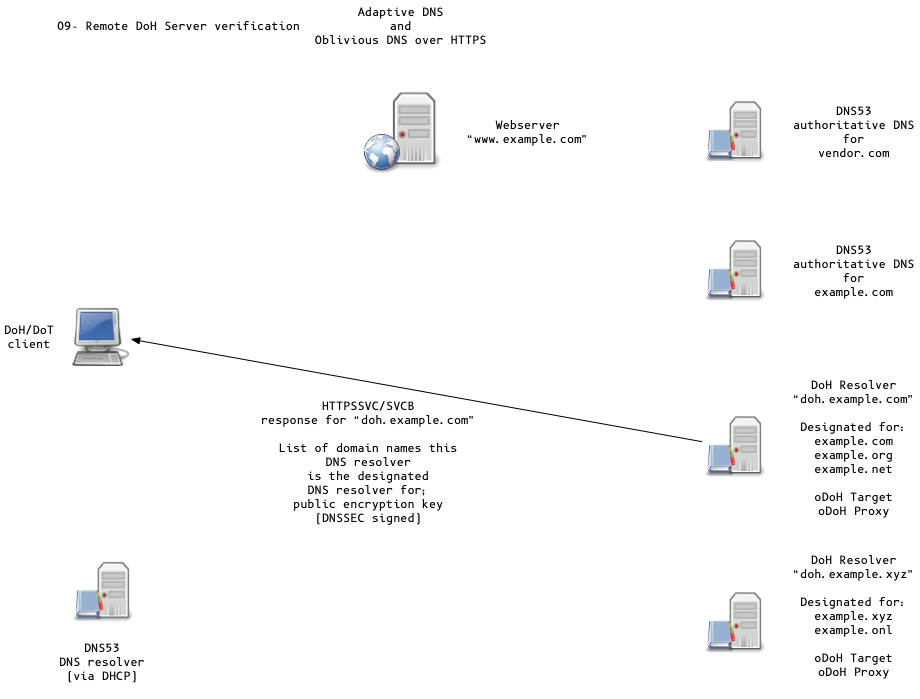
All content © 2020 Internet Systems Consortium, Inc.

Adaptive DNS Discovery and oDoH
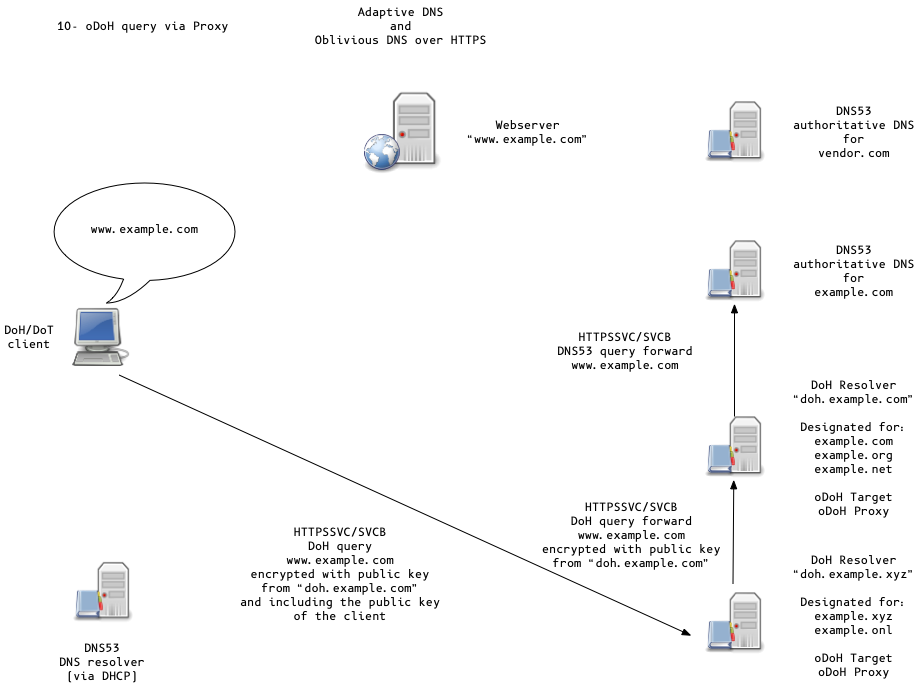
All content © 2020 Internet Systems Consortium, Inc.

Adaptive DNS Discovery and oDoH
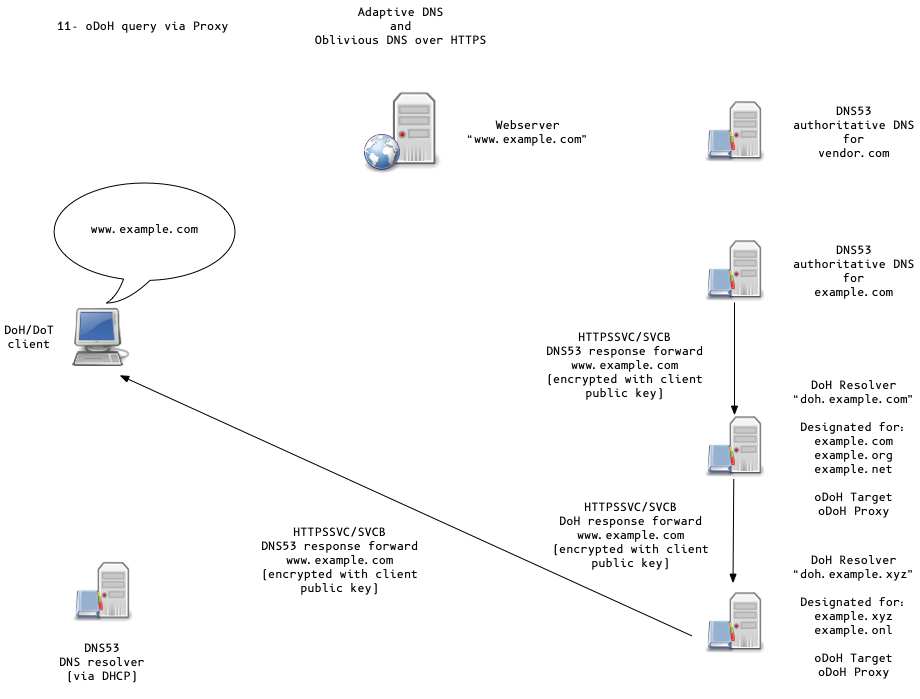
All content © 2020 Internet Systems Consortium, Inc.

Adaptive DNS Discovery and oDoH
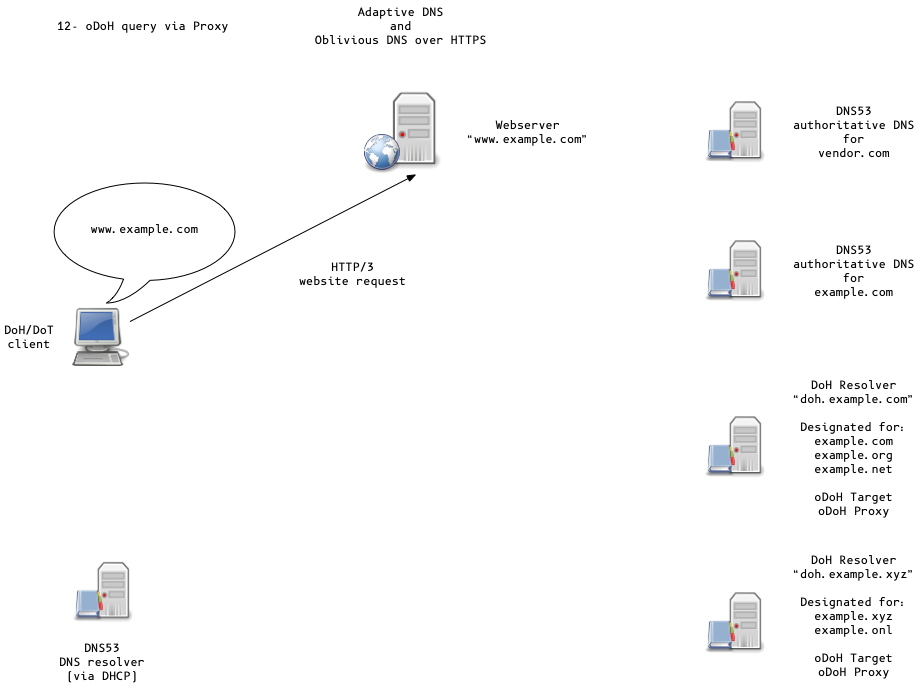
All content © 2020 Internet Systems Consortium, Inc.

Adaptive DNS Discovery and oDoH
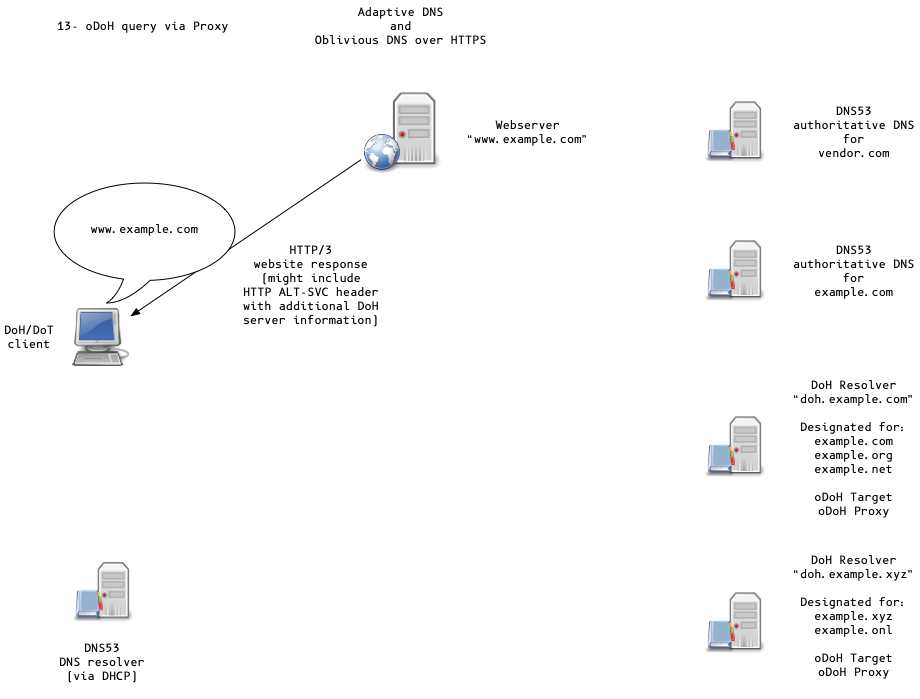
All content © 2020 Internet Systems Consortium, Inc.

Thank you
Questions
Contact: carsten@strotmann.de
All content © 2020 Internet Systems Consortium, Inc.
